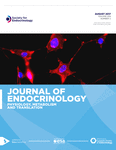Early-postnatal changes in adiposity and lipids profile by transgenerational developmental programming in swine with obesity/leptin resistance
- Antonio Gonzalez-Bulnes⇑,
- Susana Astiz,
- Cristina Ovilo1,
- Clemente J Lopez-Bote2,
- Raul Sanchez-Sanchez,
- Maria L Perez-Solana,
- Laura Torres-Rovira2,
- Miriam Ayuso2 and
- Jorge Gonzalez3
- Departamento de Reproducción Animal, INIA, Avenida Puerta de Hierro s/n, Madrid 28040, Spain
1Departamento de Mejora Genética Animal, INIA, Ctra. La Coruña km 7.5, Madrid 28040, Spain
2Facultad de Veterinaria, Universidad Complutense de Madrid, Madrid 28040, Spain
3Micros Veterinaria, Campus de Vegazana, Leon 24007, Spain
- Correspondence should be addressed to A Gonzalez-Bulnes; Email: bulnes{at}inia.es
Abstract
Maternal malnutrition during pregnancy, both deficiency and excess, induces changes in the intrauterine environment and the metabolic status of the offspring, playing a key role in the growth, status of fitness/obesity and appearance of metabolic disorders during postnatal life. There is increasing evidence that these effects may not be only limited to the first generation of descendants, the offspring directly exposed to metabolic challenges, but to subsequent generations. This study evaluated, in a swine model of obesity/leptin resistance, the existence and extent of transgenerational developmental programming effects. Pre- and postnatal development, adiposity and metabolic features were assessed in the second generation of piglets, descendant of sows exposed to either undernutrition or overnutrition during pregnancy. The results indicated that these piglets exhibited early-postnatal increases in adiposity and disturbances in lipid profiles compatible with the early prodrome of metabolic syndrome, with liver tissue also displaying evidence of paediatric liver disease. These features indicative of early-life metabolic disorders were more evident in the males that were descended from overfed grandmothers and during the transition from milk to solid feeding. Thus, this study provides evidence supporting transgenerational developmental programming and supports the necessity for the development of strategies for avoiding the current epidemics of childhood overweight and obesity.
- Received in final form 26 July 2014
- Accepted 8 August 2014
- Made available online as an Accepted Preprint 8 August 2014
- © 2014 Society for Endocrinology











